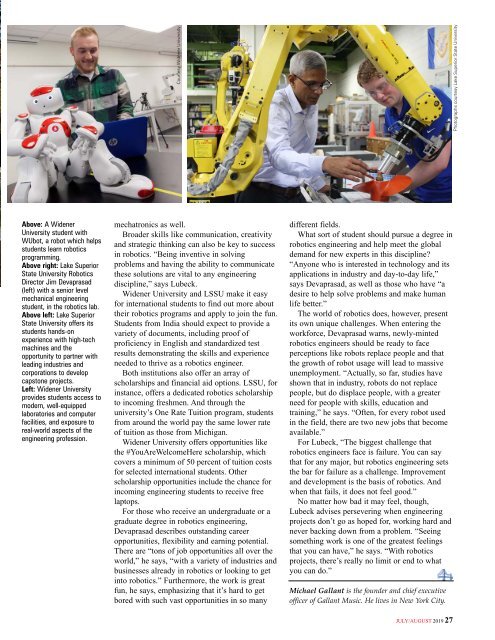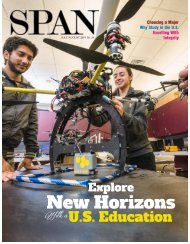July-August 2019
You also want an ePaper? Increase the reach of your titles
YUMPU automatically turns print PDFs into web optimized ePapers that Google loves.
Courtesy Widener University<br />
Photographs courtesy Lake Superior State University<br />
Above: A Widener<br />
University student with<br />
WUbot, a robot which helps<br />
students learn robotics<br />
programming.<br />
Above right: Lake Superior<br />
State University Robotics<br />
Director Jim Devaprasad<br />
(left) with a senior level<br />
mechanical engineering<br />
student, in the robotics lab.<br />
Above left: Lake Superior<br />
State University offers its<br />
students hands-on<br />
experience with high-tech<br />
machines and the<br />
opportunity to partner with<br />
leading industries and<br />
corporations to develop<br />
capstone projects.<br />
Left: Widener University<br />
provides students access to<br />
modern, well-equipped<br />
laboratories and computer<br />
facilities, and exposure to<br />
real-world aspects of the<br />
engineering profession.<br />
mechatronics as well.<br />
Broader skills like communication, creativity<br />
and strategic thinking can also be key to success<br />
in robotics. “Being inventive in solving<br />
problems and having the ability to communicate<br />
these solutions are vital to any engineering<br />
discipline,” says Lubeck.<br />
Widener University and LSSU make it easy<br />
for international students to find out more about<br />
their robotics programs and apply to join the fun.<br />
Students from India should expect to provide a<br />
variety of documents, including proof of<br />
proficiency in English and standardized test<br />
results demonstrating the skills and experience<br />
needed to thrive as a robotics engineer.<br />
Both institutions also offer an array of<br />
scholarships and financial aid options. LSSU, for<br />
instance, offers a dedicated robotics scholarship<br />
to incoming freshmen. And through the<br />
university’s One Rate Tuition program, students<br />
from around the world pay the same lower rate<br />
of tuition as those from Michigan.<br />
Widener University offers opportunities like<br />
the #YouAreWelcomeHere scholarship, which<br />
covers a minimum of 50 percent of tuition costs<br />
for selected international students. Other<br />
scholarship opportunities include the chance for<br />
incoming engineering students to receive free<br />
laptops.<br />
For those who receive an undergraduate or a<br />
graduate degree in robotics engineering,<br />
Devaprasad describes outstanding career<br />
opportunities, flexibility and earning potential.<br />
There are “tons of job opportunities all over the<br />
world,” he says, “with a variety of industries and<br />
businesses already in robotics or looking to get<br />
into robotics.” Furthermore, the work is great<br />
fun, he says, emphasizing that it’s hard to get<br />
bored with such vast opportunities in so many<br />
different fields.<br />
What sort of student should pursue a degree in<br />
robotics engineering and help meet the global<br />
demand for new experts in this discipline?<br />
“Anyone who is interested in technology and its<br />
applications in industry and day-to-day life,”<br />
says Devaprasad, as well as those who have “a<br />
desire to help solve problems and make human<br />
life better.”<br />
The world of robotics does, however, present<br />
its own unique challenges. When entering the<br />
workforce, Devaprasad warns, newly-minted<br />
robotics engineers should be ready to face<br />
perceptions like robots replace people and that<br />
the growth of robot usage will lead to massive<br />
unemployment. “Actually, so far, studies have<br />
shown that in industry, robots do not replace<br />
people, but do displace people, with a greater<br />
need for people with skills, education and<br />
training,” he says. “Often, for every robot used<br />
in the field, there are two new jobs that become<br />
available.”<br />
For Lubeck, “The biggest challenge that<br />
robotics engineers face is failure. You can say<br />
that for any major, but robotics engineering sets<br />
the bar for failure as a challenge. Improvement<br />
and development is the basis of robotics. And<br />
when that fails, it does not feel good.”<br />
No matter how bad it may feel, though,<br />
Lubeck advises persevering when engineering<br />
projects don’t go as hoped for, working hard and<br />
never backing down from a problem. “Seeing<br />
something work is one of the greatest feelings<br />
that you can have,” he says. “With robotics<br />
projects, there’s really no limit or end to what<br />
you can do.”<br />
Michael Gallant is the founder and chief executive<br />
officer of Gallant Music. He lives in New York City.<br />
JULY/AUGUST <strong>2019</strong> 27



